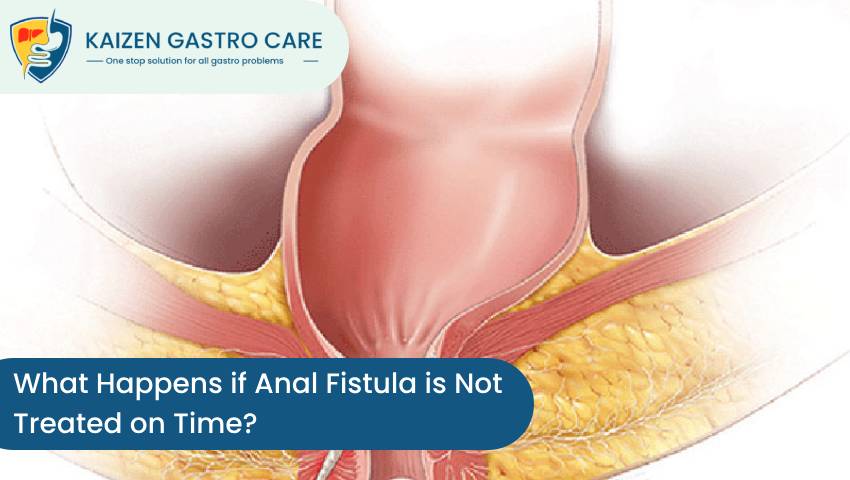
- 25/07/2023
- Kaizen Gastro Care
- 0 Comments
- Proctology
What Happens if Anal Fistula is Not Treated on Time?
An anal fistula is a painful condition that occurs when an infected tunnel forms between the skin surrounding the anus and the rectum. While it can be uncomfortable to discuss, it’s important to understand the potential consequences of leaving an anal fistula untreated. Ignoring or postponing treatment can lead to complications that affect both your physical and emotional well-being.
In this blog post, we will explore the consequences of not treating an anal fistula on time and highlight the importance of seeking medical care promptly. At Kaizen Gastro Care, we are committed to providing comprehensive care for anal fistulas and ensuring your well-being.
Treatments:
Surgery is almost always required to treat an anal fistula. The purpose of the surgery is a balance between getting alleviated of the fistula while protecting the anal sphincter muscles, which could cause incontinence if injured.
Treatment options for anal fistula:
- Fistulotomy
- Ksharsutra
- FiLaC procedure (Fistula-tract Laser Closure)
- Fistula Plug
- Seton placement and surgery
- Laser fistula treatment
- LIFT procedure (Ligation of Intersphincteric Fistula Tract)
- PILTEC: a modification of the LIFT procedure
- VAAFT procedure (Video-assisted Anal Fistula Treatment)
Complications of Untreated Anal Fistulas:
- Persistent Pain and Discomfort: One of the primary signs of an anal fistula is pain, which can range from mild to severe. If the condition is left untreated, the pain can become chronic and persistent. The fistula tract may become infected, causing raised inflammation and discomfort. The constant presence of pain can make it difficult for people to engage in their everyday activities and lead to a decreased quality of life.
- Formation of Complex Fistulas: Anal fistulas have the possibility to become more complex over time if left untreated. The tunnels linking the infected glands can branch out, creating multiple openings or tracts. These complex fistulas are notoriously difficult to treat and may require invasive surgical approaches. The longer treatment is delayed, the more likely it evolves for a simple fistula to progress into a complex and challenging condition to manipulate.
- Fecal Incontinence and Bowel Dysfunction: In some cases, an untreated anal fistula can lead to long-term bowel dysfunction and fecal incontinence. The ongoing infection and inflammation associated with the fistula can weaken the anal sphincter muscles, which are responsible for controlling bowel movements. As a result, people may experience difficulty in controlling their bowel movements, leading to involuntary leakage of stool and gas. Fecal incontinence can be socially isolating and extremely impact a person’s emotional well-being.
- Anal Stenosis: Untreated anal fistulas can lead to a condition known as anal stenosis. This happens when the tissues in the anal region become scarred and narrow, causing difficulty and discomfort during bowel movements. Anal stenosis can significantly impact the patient’s quality of life, making passing stools a painful and hurtful experience.
- Persistent Infections: One of the primary risks associated with delaying treatment for an anal fistula is the persistence of recurrent infections. An untreated fistula provides a constant pathway for bacteria to enter and exit the body, leading to recurring abscesses and distressing infections. These infections can result in intense pain, swelling, and the formation of pus-filled pockets, making a cycle of discomfort that can greatly impact a person’s quality of life.
- Abscess Formation: As an untreated anal fistula continues, there is a higher probability of developing abscesses. Abscesses are painful, localized collections of pus that form as a result of infection. They can cause intense pain, swelling, and problem with bowel movements. Treating abscesses often involves draining the pus and administering antibiotics. However, if the underlying fistula is not addressed, the abscesses are likely to recur, leading to a never-ending cycle of infections and abscess formation.
- Risk of Anal Stricture: In some cases, untreated anal fistulas can lead to a condition known as an anal stricture. An anal stricture happens when the tissues around the anus become scarred and narrowed, resulting in difficulty passing stools. This can induce intense pain, constipation, and even bowel obstruction. Anal strictures often need surgical intervention to relieve symptoms and restore normal bowel function.
- Systemic Infection(Sepsis): In rare cases, an untreated anal fistula can lead to a systemic infection, also known as sepsis. Sepsis happens when the infection spreads throughout the body, impacting vital organs and potentially becoming life-threatening. Signs of sepsis include high fever, rapid heartbeat, confusion, and shortness of breath. Timely treatment of an anal fistula can help control the risk of systemic infection.
- Increased Risk of Anal Cancer: While rare, untreated anal fistulas can potentially enhance the risk of developing anal cancer. Chronic inflammation and ongoing irritation in the anal area may contribute to the growth of precancerous changes and the subsequent progression to cancerous cells. It is important to note that anal cancer is highly treatable when detected early, emphasizing the significance of timely intervention.
Conclusion:
Seeking timely treatment for an anal fistula is crucial to prevent potential complications and maintain a good quality of life. If you suspect you have an anal fistula, it is vital to consult with a gastroenterologist, Colorectal Surgeon, or Fistula Specialist in Pune, Maharashtra. With proper medical intervention, including surgical options tailored to your specific condition, you can effectively address and fix anal fistulas, minimizing the risk of long-term complications.
At Kaizen Gastro Care, we urge you to prioritize your health and take action at the earliest symptoms of an anal fistula. Our team of experienced medical professionals is here to provide you with effective treatments and compassionate care, ensuring a swift recovery and the restoration of your comfort and quality of life. Remember, early intervention is key, so don’t delay; schedule a consultation today and let us guide you towards a healthier tomorrow.
